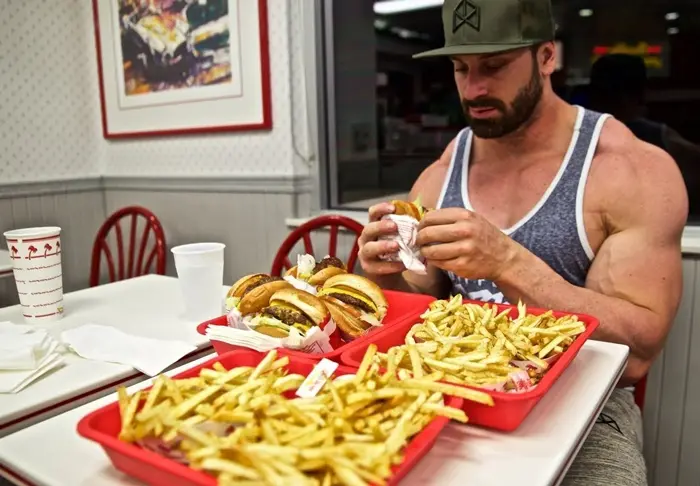Food is one of life’s pleasures. Most people eat not only because it’s necessary for life but also because they enjoy it!
We celebrate special occasions by eating specially-prepared meals, socializing with food, and giving food gifts. Food and eating are integral parts of human existence that go beyond the basic need for energy and nutrients.
However, it’s sometimes necessary to change or control your food intake.
For example, you may eat more high-protein foods to increase muscle mass or reduce your caloric intake to lose fat. Or, you may just want to eat more vegetables and fruits to improve your health.
We call this dieting.
To make any diet easier to stick to, many include cheat meals. Some people simply have a cheat meal to break up periods of healthy eating.
Unfortunately, it’s these cheat meals that may be stopping you from reaching your goals.
In this article, we reveal the strategies you can use to stop your cheat meals from derailing your diet. In short, we’re going to teach you how to cheat and win!
What Are Cheat Meals?
There are lots of different diets, and they all have different purposes. Some are weight-loss diets, while others are bulking diets. Some diets are purely for better health. But, regardless of why you are dieting, it will inevitably involve following a pre-determined eating plan and giving up some of your favorite foods.

Unfortunately, following a restrictive diet can lead to feelings of deprivation, cravings, and, in the case of weight-loss diets, hunger.
Cravings are often triggered by knowing that you can’t eat a particular food. For example, if your diet bans sugar, you may soon find yourself craving something sweet, even if you usually don’t have much of a sweet tooth. This is one of the reasons that exclusion diets (diets that ban certain foods or food groups) are so hard to stick to.
Most people can ignore these sensations for a few days or even a week or more. But, eventually, willpower will run out, and you’ll end up cheating on your diet. You may even quit it for good.
And that’s where cheat meals come in.
Cheat meals allow you to eat the foods that are usually banned by your diet. They provide a brief “food vacation” so you can enjoy a guilt-free meal before going back to your restrictive eating plan. This can make your diet easier to stick to in the long term.
Some people also believe that cheat meals can stop your metabolism from slowing down during long periods of undereating. However, there is very little evidence to support this.
The main benefit of cheat meals is psychological – they allow you to eat at least some of the foods that are otherwise off the menu during your diet. In short, they put the enjoyment back into eating.
Unfortunately, those cheat meals could also be why you aren’t getting the results you want from your diet.
Related: Why Am I Gaining Weight? Common Causes of Unexpected Weight Gain
When Cheat Meals Go Bad
While the occasional cheat meal could help you reach your goals sooner, more often than not, they are the reason you aren’t making such good progress.
Reasons for this include:
Binging, not cheating

A cheat meal should be precisely that; a meal during which you get to eat some of the foods that aren’t allowed on your diet. You may even eat a little more than usual.
However, many people turn what should be a sensibly sized cheat into a full-blown binge by overeating to the extreme. A lot of famous bodybuilders, strongman competitors, and Hollywood A-listers even publicize their gluttony by posting pictures of their cheat meals on social media.
Binging is probably unhealthy and will completely derail your weight loss efforts.
For example, imagine you are trying to lose weight. So, like a good dieter, you adjust your food intake to create a 500 calorie per day deficit. Over a week, this adds up to 3,500 calories, which equates to about one pound of fat.
But then, at the end of the week, you have a cheat meal consisting of 5,000 calories.
Not only have you canceled out your calorie deficit, but you’ve also put yourself into a calorie surplus and will probably gain weight rather than lose it.
Cheating too often
Even if your cheat meals are relatively small, you can undermine your progress by cheating too often. The more often you cheat, the greater the chances are that you’ll cancel out your calorie deficit and could even create a calorie surplus. Again, this will result in fat gain rather than fat loss.
Using cheat meals as an excuse for lack of discipline
A lot of people give in to temptation and inadvertently break their diet and then call it a cheat meal. A cheat meal should be planned and serve a specific purpose. Just giving up on your diet and calling a cheat meal undermines the process by putting a positive spin on what is actually a failure in discipline.
Breaking your diet and eating a bunch of junk food is not a cheat meal – that’s quitting your diet. Calling it a cheat meal means what should be viewed as a dietary fail is considered in almost a positive light. As such, it’s likely to happen again, and again, and again.
There is a vast difference between a planned cheat meal and not having the willpower to stick to your diet.
You may not even deserve a cheat meal
If your diet is not very good at the best of times, or your workouts are infrequent, you probably haven’t done enough to have earned a cheat meal.
A cheat meal is a sort of reward for dietary and workout compliance – you’ve got to earn it. If you’ve been slacking off in the gym or not sticking to your diet like you know you should, having a cheat meal will just make matters worse.
Cheat meals send the wrong nutritional message
The occasional cheat meal is probably nothing to be worried about and can even be beneficial. However, that’s not always the case.
In fact, for some people, cheat meals could create a negative relationship with food.
Healthy eating should not be viewed as a punishment. Instead, it’s what’s needed for longevity, long-term weight management, and better health. It’s the very cornerstone of existence; you are what you eat!
But, if you feel that eating healthily needs to be rewarded with junk food, you may have a skewed relationship with food.
Food is neither good nor bad; it just is. You should be able to eat most foods in moderation without feeling like you need to reward yourself with junk food just because you ate a few vegetables. If you can’t, you may have an emotional issue with food that needs resolving.
How to Cheat and Win!
Use these strategies to stop cheat meals ruining your diet, undermining your progress, and harming your health:
1. Schedule your cheat meals
If you don’t plan your cheat meals in advance, you are much more likely to cheat more often than you should. So, instead, choose a day and a time for your cheat meal and commit to maintaining your diet right up to that point. Knowing when your cheat meal is due to happen gives you something to look forward to and may stop you from cheating more often.
So, for example, decide that Saturday dinners are cheat meals. Other ad hoc cheat meals are NOT permitted!
2. Don’t turn a cheat meal into a cheat weekend!
The worst time to have a cheat meal is Friday night. It makes it all too easy to turn what should have been a solitary cheat meal into a weekend-long binge. Remember, the bigger the cheat, the more likely it will cancel out your previous week of healthy eating.
So, a cheat meal is exactly that – a single meal or snack. Don’t let your cheat meal roll over into the next day.
3. Cheat, don’t binge
There is a huge difference between a rewarding cheat meal and a junk food binge. After a week of healthy eating, you may feel ready to eat your entire body weight in ice cream, candy, or pizza. Still, such huge servings will definitely cancel out your otherwise healthy diet.
You are NOT a family of four, and you do not need to eat like one!
Instead, practice sensible portion control to avoid turning a cheat meal into a binge. So, avoid things like all-you-can-eat buffets and order regular-sized portions of cheat food instead.
If you plan on having your cheat meal at home, don’t bulk buy your treats as, invariably, you’ll eat whatever you’ve purchased.
4. Train before you cheat
You can make the effects of your cheat meal less impactful by eating shortly after exercise. Intense workouts cause an increase in insulin sensitivity, GLUT 4 production, and metabolic rate (1). This means at least some of your excess calories and nutrients will be used for fuel or preferentially driven into your muscles and liver and away from your fat stores.
While training before a cheat meal won’t entirely counteract all the adverse effects, it will lessen the impact of overeating.
5. Don’t store cheat foods in your home
If lack of willpower means you cannot resist junk food at home, make your home a junk food-free zone. Don’t buy cheat foods to store for later. You’ll probably eat them long before your scheduled cheat day and then cheat anyway, doubling your intake of junk food.
Remove temptation by never having junk food at home. Then, when it’s time for your cheat meal, go out and buy what you need, eat it, and return to your diet without temptation hanging over you.
6. Base cheat meal frequency on where you are in relation to your goals
Many people want to know how often they can cheat on their diet. Some think it’s weekly, while others cheat several times a week.
Ultimately, cheat meal frequency depends on how far you are from your body composition goals.
For example, if you’ve got 30-50 pounds to lose, you probably shouldn’t really be thinking about cheat meals. You have too much work left to do, and cheat meals will just make things harder. You need to gain some weight loss momentum before you start thinking about cheat meals.
In contrast, if you’ve just got a few more pounds left to lose, you can probably cheat a couple of times a week and still make progress toward your goal. You’ve done the hard yards, and while a few extra cheats may slow your progress a little, you’re almost there, so that’s nothing to worry about.
So, be honest and base your cheat meal frequency on where you are in relation to your ultimate goal. The closer you are, the more cheat meals you can afford. But, if you’ve still got a long way to go, you need to focus on dietary compliance, and even planned cheats could make sticking to your diet harder than it needs to be.
7. Get back on your healthy diet immediately after your cheat meal
It’s all too easy to let a cheat meal become a cheat day. Instead, break the cycle by ensuring that your next meal adheres to your current diet. Think of your cheat meal as “one and done.” The sooner you get back to your regular diet, the faster you’ll get back on track toward your goals.
So, as well as planning your cheat meal in advance, plan your follow-up meal, so you know that you’ll be back to your regular diet straight after.
Wrapping Up
In a perfect world, no one would need cheat meals. Instead, you should be able to achieve your fitness and body composition goals simply by consuming adjusting your calorie intake while eating a balanced mix of foods.
Unfortunately, that approach is harder in practice than on paper. Therefore, most people need to follow prescriptive diets to control body composition or increase muscle mass. Invariably, this means eating less of the foods you like.
Cheat meals provide a psychological break from restrictive diets and make them easier to live with. However, what should be something beneficial can soon turn bad and derail your progress when misused.
Use the strategies in this article to get the best from cheat meals. But, remember, even if you adhere to these guidelines, your cheat meal will still put the brakes on your progress, albeit temporarily.
And what about those super-lean bodybuilders who get ripped while eating mountains of junk food? That’s the power of performance-enhancing drugs like human growth hormone, insulin, and thyroid hormones.
So, if you can manage without cheating at all or can limit cheat meal frequency to just a couple of times a month, you’ll probably reach your dietary goals sooner.
References:
1. PubMed: Exercise and insulin sensitivity https://pubmed.ncbi.nlm.nih.gov/10683091/
Tip: If you're signed in to Google, tap Follow.













